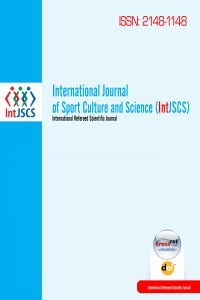Evaluating the Influence of Employees’ Professional Ethic on Their Knowledge Sharing (A Case Study: the Health Insurance Administration of Kermanshah Province)
Evaluating the Influence of Employees’ Professional Ethic on Their Knowledge Sharing (A Case Study: the Health Insurance Administration of Kermanshah Province)
Professional ethics, Knowledge sharing Health insurance,
___
- Ansari M, Husseini A, Rahmani Yushaneloei H, Saifi S (2012) The effect of employees’ professional ethic principles on the knowledge sharing in the information technology field, Ethic in Science and Technology quarterly, 3(1): 40-52.
- Baikzadeh J, Sadeqi M, Abrahampour D (2012) The effect of organizational factors on the professional ethic growth of employees’. Ethic in Science and Technology quarterly, 2(7):1-9.
- Bennett R & Gabriel H (2009). Organizational factors and Knowledge management within large marketing departments: an empirical study, Journal of Knowledge Management, 3(3), 212-225.
- Bouref Al (2004) The ethic quality for the excellence of an organization, translated by Reza Najaf Beygi, Jaffar Rahmani and Esmail Kavoosi, Tehran: An outlook.
- Brink P (2007). Measurement of Conditions for Knowledge Sharing, Published in Proceedings 2nd European Conference on Knowledge, Bled, November.
- Cem-Ersoy N, Bron M, Derous E & Molen H (2010). Antecedent of organization citizenship behavior among blue- and white- collar workers in Turkey. International journal of intercultural relations. 35(3), 356-367.
- Cherring DJ (2008). The work ethic: working values and values that work. Amacom Books. New York, 43.
- Connelly C & Kelloway EK (2000). Predictors of employees’ perceptions of knowledge sharing cultures. Journal: Leadership & Organization Development Journal, 2003. p.p.294 – 301.
- Du R, Ai S & Ren Y (2006). Relationship between Knowledge Sharing and Performance: A Survey in Xi An, China, Expert Systems with Applications 32.
- Gurteen D (1999). Creating a knowledge –sharing culture: Knowledge management, 2(5).
- Hooff B & Ridder J (2004). “Knowledge Sharing in Context: The Influence of Organizational Commitment, Communication Climate and CMC Use on Knowledge Sharing”, Journal of Knowledge Management, 8(6).
- Kadousire A (2009). Exploring the Structure of Ethical Attributions as a
- Component of the Consumer Decision Model: The Vicarious Versus Personal Perspective. Journal of Business Ethics, 10, 285-293.
- Meriac J, Poling TL & Woehr DJ (2009). Are there gender differences in work ethic? An examination of measurement equivalence of the multidimensional work ethic profile. Personality and individual differences, 47, 209-213.
- Moeidfar S (2006) Investigating the work ethic and effective factors on it in the government departments employees’. Social welfare, 23(6): 321-341.
- Nonaka I & Takeuchi H (2005). The Knowledge Creating Company, OxfordUniversity Press. Noorani, Elahe (2012) Investigation of the relationship between managers’ professional ethic and knowledge management in the University of Science and Culture. Master’s degree dissertation, Faculty of Human Sciences, Tehran: University of Science and Culture.
- Pezeshkirad G, Alizadeh N, Zamai Miandashti N, ShabanAli Fami H (2011) The effective factors in the knowledge sharing among the organization employees’, The International Journal of Science and Technology, 4(13): 491-501.
- Qorbani M (2012) Investigating the relationship of spirituality intelligence and professional ethic with effectiveness of knowledge sharing, Master’s degree dissertation, The faculty of Economic and Administrative Sciences, Semnan: University of Semnan.
- Saks AM, Mudrack PE & Ashforth BE (2006). The relationship between the work ethic, job attitudes, intentions to quit, and turnover for temporary service employees. Canadian journal of administrative sciences. 13(3), 226-236.
- Tajzadeh Namin, Abolfazl, Tajzadeh Namin, Abdin, Mortaei Gare Balag, Reza (2010) The relationship of employees’ ethic interaction with their performance, Commercial Management, 2(6): 41-56.
- Whalen J, Pitts RE, Wong JK (2001). Exploring the Structure of Ethical Attributions as a Component of the Consumer Decision Model: The Vicarious Versus Personal Perspective. Journal of Business Ethics, 10, 285-293.
- Yaginlu, Mehrangiz, Javaher Dahsti, Faranak, Khalili Iraqi, Maryam (2003) The professional ethic principle from preparation to practice, Tadbir monthly, 135, 80-88.
- Zhang J (2006). The Effect of Organizational/ Technological Factors and The Nature of Knowledge on Knowledge Sharing, Proceedings of The 39th Hawaii International Conference on System Sciences.
- ISSN: 2148-1148
- Başlangıç: 2013
- Yayıncı: Uluslararası Bilim Kültür ve Spor Derneği (UBİKS)
Emotional Intelligence, Physical Activity and Coping with Stress in Adolescents
Ali Aziz Dawood AL SUDANI, Kamila BUDZYNSKA
Yoga, Anxiety, and Some Cardiovascular Risk Factors in Women1
Asim CENGIZ, Mensure YAMAN, Cetin YAMAN
Alexander PAVLOV, Elena KOMOVA, Alexander PETROV
Angela MAGNANINI, Pau Espinosa TRULL
Nikolay MOROZOV, Tatiana MOROZOVA
Saliha AĞAÇ, Nalan GÜRŞAHBAZ, Berna YILDIRIM ARTAÇ
Moisés Diego GERMANO, Renê Scarpari De MATTOS, Márcio Antonio Gonsalves SINDORF, Paulo Henrique MARCHETTI, Rozangela VERLENGIA, Charles Ricardo LOPES, Gustavo Ribeiro Da MOTA, Alex Harley CRISP
Effect of Yoga and Aerobic Training on Bio Chemical Variables in Middle Aged Diabetic Patients
